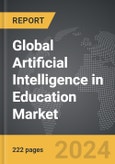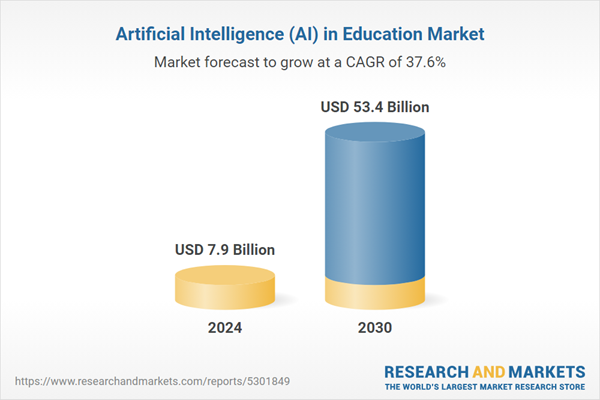Global Artificial Intelligence (AI) in Education Market - Key Trends and Drivers Summarized
How Are AI-Driven Technologies Changing Traditional Educational Models?
Artificial Intelligence (AI) is revolutionizing the education landscape by introducing dynamic tools that reshape traditional learning environments, from K-12 classrooms to higher education institutions. AI-powered technologies such as personalized learning platforms and intelligent tutoring systems (ITS) bring tailored educational experiences directly to students, adapting content to meet each learner’s specific needs. Through machine learning algorithms, these systems can analyze vast amounts of data to understand individual learning patterns, identify areas for improvement, and adjust lesson content in real-time, enabling students to progress at their own pace. For instance, platforms like Carnegie Learning and Knewton harness AI to adapt lesson difficulty based on student performance, creating a highly customized experience akin to one-on-one tutoring. Beyond individual instruction, AI also assists teachers by automating repetitive administrative tasks like grading, attendance, and student progress tracking, freeing educators to focus on more meaningful interactions and fostering a supportive, engaging classroom environment. The incorporation of AI into traditional educational models represents a shift from a one-size-fits-all approach to a more student-centered, data-driven framework, transforming the way education is delivered and received.Can AI Increase Global Access and Inclusivity in Education?
AI’s potential to bridge educational gaps and provide inclusive learning experiences is one of its most powerful contributions to global education. By leveraging AI, education becomes more accessible, especially for students in remote areas, underserved communities, or those with disabilities. Tools like real-time language translation, adaptive learning platforms, and virtual classrooms allow students worldwide to access high-quality educational content without geographic or linguistic barriers. Duolingo, for example, uses AI to tailor language-learning lessons that accommodate various skill levels, making language acquisition accessible and effective even without a live instructor. Additionally, AI-driven applications can offer real-time captioning and sign-language interpretation, significantly improving accessibility for students with hearing impairments. Other personalized learning tools for special education adapt resources to the specific cognitive or physical needs of individual students, ensuring that all learners can engage meaningfully. By breaking down traditional obstacles and promoting inclusivity, AI democratizes education on a global scale, helping to address disparities that have long existed in educational access and support.How is AI Enhancing Teacher-Student Interactions in Modern Classrooms?
AI doesn’t replace the role of educators but enhances it, changing the nature of teacher-student interactions and fostering a more collaborative learning environment. Through predictive analytics, AI enables teachers to gain insights into students` progress, understanding when a student might struggle or disengage. Early identification of these patterns allows teachers to intervene in timely, targeted ways, addressing issues before they hinder learning. Virtual assistants and AI-powered chatbots further support this relationship by offering around-the-clock guidance to students, answering frequently asked questions, and providing additional resources outside classroom hours. This real-time feedback loop helps maintain continuous learning support while allowing educators to concentrate on higher-order tasks such as promoting creativity, critical thinking, and problem-solving skills. Advanced assessment tools like Gradescope, equipped with AI-based grading algorithms, streamline the evaluation of complex written assignments, reducing teachers’ administrative workload while maintaining high accuracy. By equipping teachers with these AI-driven insights and support systems, AI fosters a classroom culture where educators and students work together more fluidly, strengthening the learning experience and ensuring that each student’s needs are met more precisely and efficiently.What Is Driving the Rapid Growth in the AI in Education Market?
The growth in the AI in education market is driven by several factors, reflecting a collective shift towards technology-enhanced, data-rich, and flexible learning environments. A growing emphasis on personalized and adaptive learning models has sparked demand for AI tools that can customize educational content based on individual student needs and preferences. Technological advances, especially in natural language processing (NLP), are pivotal, as NLP enhances AI’s ability to process human language, enabling intelligent tutoring systems, virtual assistants, and multilingual support, which are essential for diverse classrooms and online platforms. Additionally, the rising adoption of cloud-based AI solutions across educational institutions is driving growth, as these platforms offer scalable and secure resources that can handle large datasets, automate instructional tasks, and support remote learning frameworks. Shifting consumer preferences toward self-paced and on-demand learning experiences have led to a significant increase in EdTech adoption, with students and educators increasingly seeking flexible educational tools. Furthermore, government support for EdTech innovation, alongside strategic partnerships between technology companies and educational organizations, is fostering new applications of AI in education. The integration of predictive analytics in higher education allows institutions to make data-driven decisions, optimizing both operational efficiency and academic outcomes. Collectively, these growth drivers underscore AI’s transformative impact, making it a critical element in the evolving educational ecosystem.SCOPE OF STUDY:
The report analyzes the Artificial Intelligence (AI) in Education market in terms of units by the following Segments, and Geographic Regions/Countries:- Segments: Component (Services, Solutions); Deployment (Cloud, On-Premise); Application (Virtual Facilitators & Learning Environments, Content Delivery Systems, Intelligent Tutoring Systems, Fraud & Risk Management, Other Applications)
- Geographic Regions/Countries: World; United States; Canada; Japan; China; Europe (France; Germany; Italy; United Kingdom; and Rest of Europe); Asia-Pacific; Rest of World.
Key Insights:
- Market Growth: Understand the significant growth trajectory of the Services segment, which is expected to reach US$39.7 Billion by 2030 with a CAGR of a 38.4%. The Solutions segment is also set to grow at 35.3% CAGR over the analysis period.
- Regional Analysis: Gain insights into the U.S. market, valued at $2.4 Billion in 2024, and China, forecasted to grow at an impressive 35.8% CAGR to reach $7.7 Billion by 2030. Discover growth trends in other key regions, including Japan, Canada, Germany, and the Asia-Pacific.
Why You Should Buy This Report:
- Detailed Market Analysis: Access a thorough analysis of the Global Artificial Intelligence (AI) in Education Market, covering all major geographic regions and market segments.
- Competitive Insights: Get an overview of the competitive landscape, including the market presence of major players across different geographies.
- Future Trends and Drivers: Understand the key trends and drivers shaping the future of the Global Artificial Intelligence (AI) in Education Market.
- Actionable Insights: Benefit from actionable insights that can help you identify new revenue opportunities and make strategic business decisions.
Key Questions Answered:
- How is the Global Artificial Intelligence (AI) in Education Market expected to evolve by 2030?
- What are the main drivers and restraints affecting the market?
- Which market segments will grow the most over the forecast period?
- How will market shares for different regions and segments change by 2030?
- Who are the leading players in the market, and what are their prospects?
Report Features:
- Comprehensive Market Data: Independent analysis of annual sales and market forecasts in US$ Million from 2024 to 2030.
- In-Depth Regional Analysis: Detailed insights into key markets, including the U.S., China, Japan, Canada, Europe, Asia-Pacific, Latin America, Middle East, and Africa.
- Company Profiles: Coverage of players such as Aleks, AWS, Blackboard, Bridgeu, Carnegie Learning and more.
- Complimentary Updates: Receive free report updates for one year to keep you informed of the latest market developments.
Some of the 296 companies featured in this Artificial Intelligence (AI) in Education market report include:
- Aleks
- AWS
- Blackboard
- Bridgeu
- Carnegie Learning
- Century
- Cognii
- Cognizant
- Dreambox Learning
- Elemental Path
- Fishtree
- IBM
- Jellynote
- Jenzabar
- Knewton
- Luilishuo
- Metacog
- Microsoft
- Nuance Communications
- OSMO
- Pearson
- Quantum Adaptive Learning
- Querium Corporation
- Third Space Learning
This edition integrates the latest global trade and economic shifts as of June 2025 into comprehensive market analysis. Key updates include:
- Tariff and Trade Impact: Insights into global tariff negotiations across 180+ countries, with analysis of supply chain turbulence, sourcing disruptions, and geographic realignment. Special focus on 2025 as a pivotal year for trade tensions, including updated perspectives on the Trump-era tariffs.
- Adjusted Forecasts and Analytics: Revised global and regional market forecasts through 2030, incorporating tariff effects, economic uncertainty, and structural changes in globalization. Includes segmentation by product, technology, type, material, distribution channel, application, and end-use, with historical analysis since 2015.
- Strategic Market Dynamics: Evaluation of revised market prospects, regional outlooks, and key economic indicators such as population and urbanization trends.
- Innovation & Technology Trends: Latest developments in product and process innovation, emerging technologies, and key industry drivers shaping the competitive landscape.
- Competitive Intelligence: Updated global market share estimates for 2025, competitive positioning of major players (Strong/Active/Niche/Trivial), and refined focus on leading global brands and core players.
- Expert Insight & Commentary: Strategic analysis from economists, trade experts, and domain specialists to contextualize market shifts and identify emerging opportunities.
- Complimentary Update: Buyers receive a free July 2025 update with finalized tariff impacts, new trade agreement effects, revised projections, and expanded country-level coverage.
Table of Contents
Companies Mentioned (Partial List)
A selection of companies mentioned in this report includes, but is not limited to:
- Aleks
- AWS
- Blackboard
- Bridgeu
- Carnegie Learning
- Century
- Cognii
- Cognizant
- Dreambox Learning
- Elemental Path
- Fishtree
- IBM
- Jellynote
- Jenzabar
- Knewton
- Luilishuo
- Metacog
- Microsoft
- Nuance Communications
- OSMO
- Pearson
- Quantum Adaptive Learning
- Querium Corporation
- Third Space Learning
Table Information
| Report Attribute | Details |
|---|---|
| No. of Pages | 222 |
| Published | January 2026 |
| Forecast Period | 2024 - 2030 |
| Estimated Market Value ( USD | $ 7.9 Billion |
| Forecasted Market Value ( USD | $ 53.4 Billion |
| Compound Annual Growth Rate | 37.6% |
| Regions Covered | Global |









